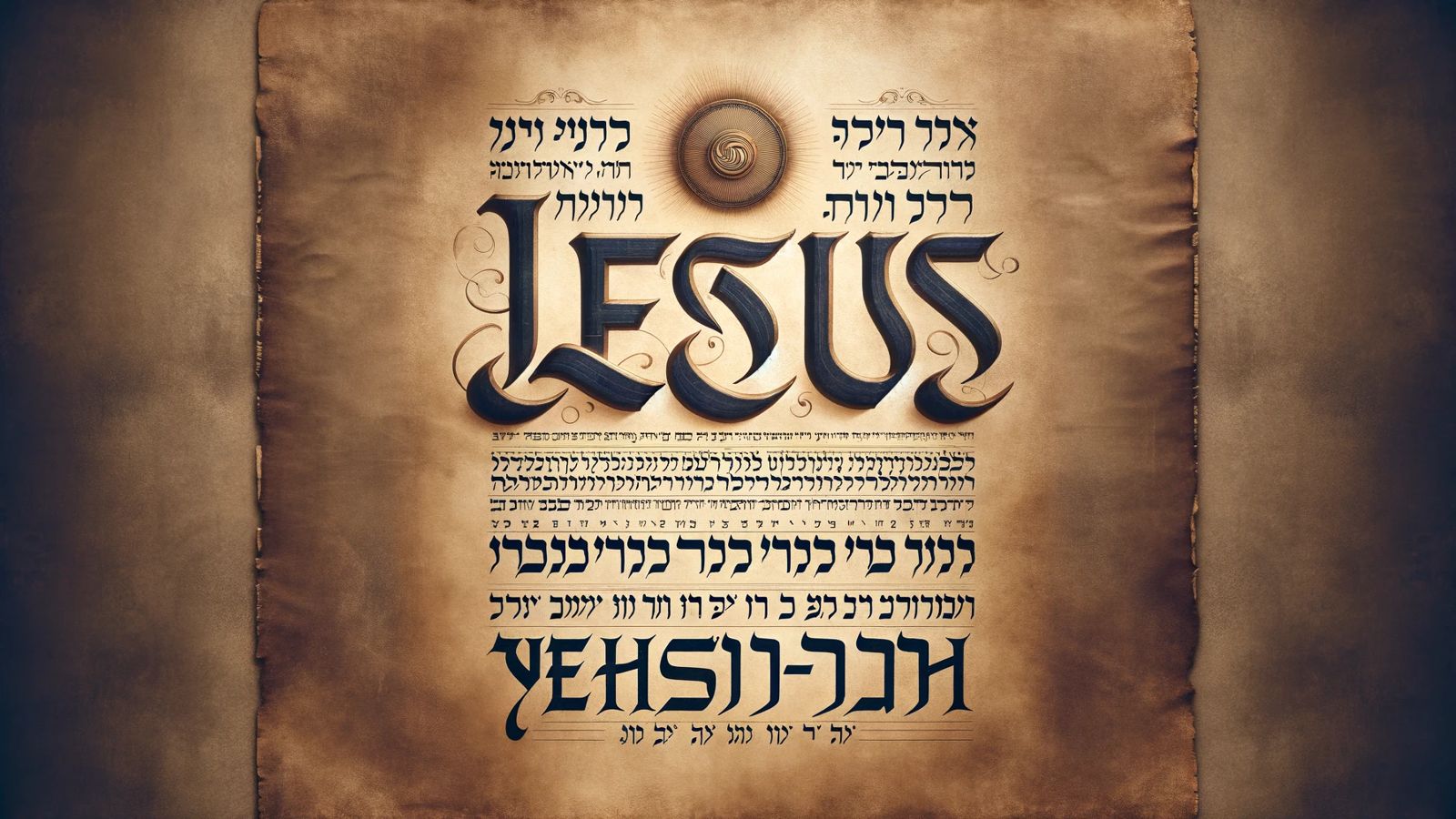Home>Christian Videos>Bible Stories>How To Say “Jesus Christ” In Aramaic


Bible Stories
How To Say “Jesus Christ” In Aramaic
Published: March 3, 2024
Ericka Andersen, an editor at Christian.net, expertly merges digital strategy with content creation, focusing on faith and societal issues. Her communication skills enhance the platform's engaging narratives, fostering meaningful dialogue on belief's impact on society.
Learn how to say "Jesus Christ" in Aramaic and explore the significance of this phrase in biblical stories. Discover the roots of the term in the context of the Bible.
(Many of the links in this article redirect to a specific reviewed product. Your purchase of these products through affiliate links helps to generate commission for Christian.net, at no extra cost. Learn more)
Table of Contents
Introduction
Have you ever wondered how to say "Jesus Christ" in Aramaic? The Aramaic language has a rich history and is closely linked to the origins of Christianity. Understanding the Aramaic translation of "Jesus Christ" can provide valuable insights into the religious and cultural context of the time. In this article, we will delve into the significance of the Aramaic language, explore the meaning of "Jesus Christ" in Aramaic, and learn how to pronounce it. Join us on this fascinating journey to uncover the roots of one of the most influential figures in religious history.
Read more: What Islam Says About Jesus Christ
Understanding the Aramaic Language
Aramaic is a Semitic language that originated in the ancient Near East and was widely spoken during the time of Jesus Christ. It holds significant importance in religious and historical contexts, as it was the language spoken by Jesus and his disciples. Aramaic has a close linguistic relationship with Hebrew and shares similarities with other Semitic languages such as Arabic and Akkadian.
The Aramaic language has several dialects, including Eastern and Western varieties, each with its own unique characteristics. It was the primary language of the Assyrian and Babylonian empires and was used as a lingua franca throughout the region. Aramaic script, known as the Aramaic alphabet, has been found in ancient inscriptions, manuscripts, and religious texts, showcasing its enduring legacy.
In the context of Christianity, the use of Aramaic holds special significance as it provides a direct link to the teachings and expressions of Jesus Christ. Many religious scholars and historians study Aramaic to gain a deeper understanding of the cultural and linguistic milieu in which Jesus lived and preached. By exploring the Aramaic language, we can gain valuable insights into the religious and historical landscape of the time, enriching our comprehension of the origins of Christianity.
The Meaning of "Jesus Christ" in Aramaic
-
Yeshua Meshikha: In Aramaic, the name "Jesus Christ" is translated as "Yeshua Meshikha." The name "Yeshua" is derived from the Hebrew name "Yehoshua," which means "Yahweh is salvation." This name holds profound significance as it reflects the role of Jesus as the savior in Christian theology. The term "Meshikha" corresponds to the Greek word "Christos," meaning "the anointed one" or "the chosen one." In the Aramaic context, "Meshikha" carries the connotation of being consecrated or anointed for a divine purpose, emphasizing Jesus' role as the Messiah.
-
Yeshua: The name "Yeshua" is central to the identity of Jesus in Aramaic, symbolizing his mission to bring salvation and redemption to humanity. The significance of this name is deeply rooted in the religious beliefs and teachings of Christianity, portraying Jesus as the embodiment of divine grace and deliverance. Understanding the Aramaic rendition of "Yeshua" provides a nuanced perspective on the spiritual and theological underpinnings of Jesus' role in Christian faith.
-
Meshikha: The term "Meshikha" underscores the messianic aspect of Jesus' mission, signifying his anointment and divine purpose. In Aramaic, the concept of the Messiah carries profound implications, representing the fulfillment of prophecies and the establishment of a new covenant between God and humanity. The Aramaic translation of "Meshikha" encapsulates the anticipation and reverence associated with the awaited deliverer, shedding light on the cultural and religious milieu of the time.
-
Symbolism and Significance: The Aramaic translation of "Jesus Christ" encapsulates the theological and eschatological significance attributed to Jesus within the Christian tradition. The combination of "Yeshua Meshikha" embodies the core tenets of Christian faith, emphasizing the salvific role of Jesus as the anointed Messiah. Delving into the meaning of "Jesus Christ" in Aramaic unveils the depth of spiritual symbolism and historical resonance embedded in the language, offering a profound insight into the foundational beliefs of Christianity.
By unraveling the meaning of "Jesus Christ" in Aramaic, we gain a deeper appreciation for the linguistic, cultural, and theological dimensions of the Christian narrative, enriching our understanding of the enduring legacy of Jesus within the Aramaic-speaking world.
Pronunciation of "Jesus Christ" in Aramaic
The pronunciation of "Jesus Christ" in Aramaic carries a distinct phonetic quality that reflects the nuances of the language. In Aramaic, the name "Yeshua" is pronounced as "Yay-shu-ah," with the emphasis on the second syllable. The vowel sound in "Yay" is akin to the long "a" sound in English, while "shu" is enunciated with a soft "sh" sound followed by a short "u" sound. The final syllable "ah" is pronounced with a clear "ah" sound, akin to the pronunciation of the letter "a" in the word "father."
Similarly, the term "Meshikha" is pronounced as "Meh-shee-khah," with the emphasis on the second syllable. The "eh" sound in "Meh" is akin to the short "e" sound in English, followed by the soft "sh" sound in "shee." The syllable "khah" is articulated with a guttural "kh" sound, resembling the pronunciation of the German "ch" in "Bach."
When combined, the pronunciation of "Yeshua Meshikha" in Aramaic resonates with a melodic cadence, reflecting the rhythmic patterns inherent in the language. The seamless fusion of syllables and consonants in "Yeshua Meshikha" encapsulates the musicality of Aramaic speech, underscoring the oral tradition and expressive nature of the language.
Mastering the pronunciation of "Jesus Christ" in Aramaic not only allows for a deeper connection to the linguistic heritage of Christianity but also fosters an appreciation for the intricate phonetic elements embedded within the Aramaic language. By embracing the authentic pronunciation of "Yeshua Meshikha," individuals can honor the linguistic legacy of the ancient Aramaic tradition, perpetuating its rich oral heritage for generations to come.
Importance of Knowing the Aramaic Translation
-
Cultural and Historical Insight: Understanding the Aramaic translation of "Jesus Christ" provides a gateway to the cultural and historical context of early Christianity. It offers a glimpse into the language spoken by Jesus and his followers, shedding light on the everyday expressions and religious discourse of the time. By delving into the Aramaic rendition of "Yeshua Meshikha," individuals can gain a deeper appreciation for the linguistic milieu in which pivotal events of Christian history unfolded.
-
Theological Understanding: Knowing the Aramaic translation of "Jesus Christ" enriches theological comprehension by unveiling the nuanced meanings embedded in the language. It allows for a more profound exploration of the spiritual significance attributed to Jesus within the Aramaic-speaking community, fostering a deeper understanding of the theological concepts and doctrinal foundations rooted in the Aramaic tradition.
-
Preservation of Linguistic Heritage: Embracing the Aramaic translation of "Jesus Christ" contributes to the preservation of a significant linguistic heritage. As a language with ancient roots and enduring cultural relevance, Aramaic holds intrinsic value in the realm of linguistic diversity and historical continuity. By acknowledging and learning the Aramaic rendition of "Yeshua Meshikha," individuals actively participate in safeguarding the linguistic legacy of the Aramaic-speaking communities.
-
Interfaith Dialogue and Understanding: Knowledge of the Aramaic translation of "Jesus Christ" fosters interfaith dialogue and understanding. It serves as a bridge for communication and mutual comprehension between individuals of diverse religious backgrounds, facilitating respectful exchanges and collaborative engagement. Understanding the Aramaic rendition of "Yeshua Meshikha" can promote interfaith harmony and mutual respect, nurturing a spirit of inclusivity and shared cultural appreciation.
-
Academic and Scholarly Pursuits: For scholars, historians, and researchers, familiarity with the Aramaic translation of "Jesus Christ" is essential for academic and scholarly pursuits. It enables in-depth exploration of primary Aramaic texts, religious manuscripts, and historical inscriptions, providing a comprehensive understanding of the linguistic and cultural dimensions of early Christian thought and expression.
In essence, knowing the Aramaic translation of "Jesus Christ" transcends mere linguistic curiosity; it encompasses a profound journey into the cultural, historical, and theological tapestry of early Christianity, while also contributing to the preservation and appreciation of the rich linguistic heritage embodied in the Aramaic language.















